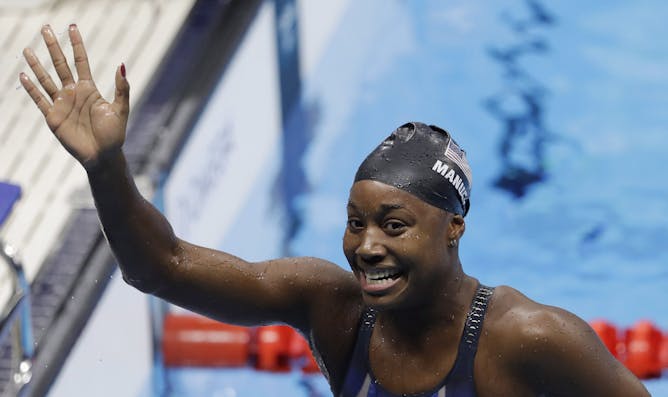|
For many Canadians, heading to the pool or the lake in the summer is a special pleasure. But for others, it can be an unpleasant experience. Today in The Conversation Canada, Jacqueline Scott of the University of Toronto writes about the troubled history that Black people have had with swimming – from much higher drowning rates to historic discrimination when it comes to accessing pools and beaches.
We’ve invited a British scholar to offer some thoughts on the ongoing Canadian-Saudi diplomatic row. Jeremy Wildeman of the University of Bath says the dispute presents Canada with an opportunity to rethink its Middle East policy – and that Ottawa “could choose a new path based on universal human rights that would greatly benefit not just Saudi Arabians but those in the broader Middle East and Canadians too.”
High school football season starts soon and Patrick Neary writes about research from the University of Regina about how an athlete's heart can be impacted by a concussion. The research looked at how concussions can also cause damage to the body’s autonomic nervous system.
And finally…Ottawa recently announced its plans to create a new national holiday – a National Day of Reconciliation – but James Miller of the University of Saskatchewan says symbolic gestures on reconciliation like new holidays and removing statues should be backed up with specific actions to address long-standing issues facing Indigenous Canadians.
Regards,
|

United States’ Simone Manuel who won the Olympic gold medal for the U.S. in the 100-meter freestyle at the 2016 Summer Olympics in Rio, said she hopes for a day when there are more Black swimmers.
(AP Photo/Natacha Pisarenko)
Jacqueline L. Scott, University of Toronto
Summer time and time to cool off in a pool or lake? The statistics reveal that race complicates the issue: in the U.S., Black people drown at five times the rate of white people.
|

Women were only just granted permission to drive in Saudi Arabia, a kingdom with an atrocious human rights record. Canada can and should leverage its ongoing spat with the country to advocate for human rights across the Middle East.
(AP Photo/Nariman El-Mofty)
Jeremy Wildeman, University of Bath
The Saudi-Canadian row offers Canada an opportunity to adopt a new Middle East policy based on universal human rights that address the needs of the many and contributes to regional stability.
|

Montreal Alouettes quarterback Johnny Manziel is tackled by the Ottawa Redblacks in Ottawa on Aug. 11, 2018. Manziel was subsequently placed under the CFL concussion protocol.
(THE CANADIAN PRESS/Justin Tang)
J. Patrick Neary, University of Regina
Recent research shows that the heart is affected when the head takes a blow, in sports-related concussion.
|

A statue of John A. Macdonald in Montreal has been repeatedly vandalized with red paint to symbolize blood. As the debate continues about removing statues, what specific actions are needed to promote reconciliation?
THE CANADIAN PRESS/Graham Hughes
James R. Miller, University of Saskatchewan
Removing statues of historical figures may be important symbolic statements when it comes to reconciliation, but action on important Indigenous issues like land claims and education are needed more.
|
Politics
|
-
Danny Bradlow, University of Pretoria
Kofi Annan was the first UN employee to rise to the position of Secretary General but his tenure also had a darker side.
|
|
Arts
|
-
Tara Colley, University of Sydney
Nicki Minaj is the preeminent female rapper. He latest album Queen embraces a kind of girl power that has been criticised both within and outside the rap world.
|
|
Environment + Energy
|
-
Peter Halkon, University of Hull
A hot summer reveals hidden history beneath the dried-out fields - but only when seen from the air.
|
|